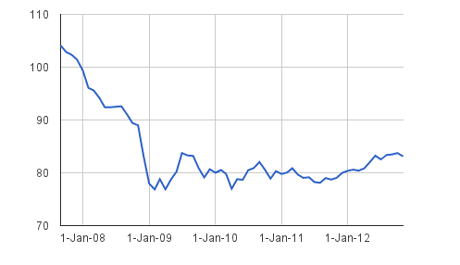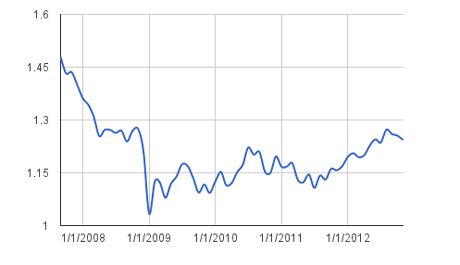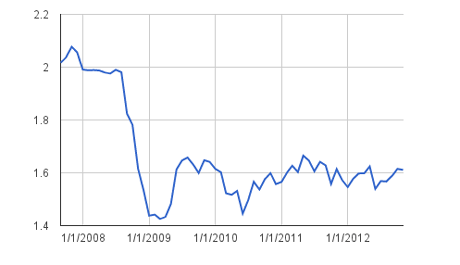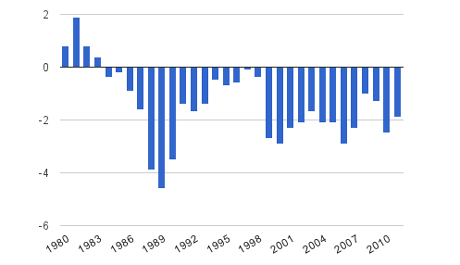The pound is heading for a big fall
After falling heavily in the financial crisis, the pound's value has changed very little in the last few years. But that could be about to change, says Phil Oakley. There’s big trouble ahead. Here's why - and what to do with your money now.
Get the latest financial news, insights and expert analysis from our award-winning MoneyWeek team, to help you understand what really matters when it comes to your finances.
You are now subscribed
Your newsletter sign-up was successful
Want to add more newsletters?

Twice daily
MoneyWeek
Get the latest financial news, insights and expert analysis from our award-winning MoneyWeek team, to help you understand what really matters when it comes to your finances.

Four times a week
Look After My Bills
Sign up to our free money-saving newsletter, filled with the latest news and expert advice to help you find the best tips and deals for managing your bills. Start saving today!
The British economy is in a mess.
Most of us know it isn't growing much. We also know that the government's finances resemble those of a credit card junkie.
But you wouldn't know it to look at the pound.
MoneyWeek
Subscribe to MoneyWeek today and get your first six magazine issues absolutely FREE

Sign up to Money Morning
Don't miss the latest investment and personal finances news, market analysis, plus money-saving tips with our free twice-daily newsletter
Don't miss the latest investment and personal finances news, market analysis, plus money-saving tips with our free twice-daily newsletter
Yes, it had a big slump after the financial crisis. But for the last three to four years or so, sterling has been a very uneventful - even boring - currency. Its value hasn't changed much at all. It has moved around in a pretty narrow range.
Don't let that lull you into a false sense of security though. We think there's big trouble ahead
The pound has gone nowhere for nearly four years
Sterling index

Have a look at the chart above. The sterling index shows the effective value of the pound against a basket of currencies.
As you can see, the banking crisis and the deep recession that followed saw the pound plummet in value during 2008. People sold the pound as Britain teetered on the brink of financial meltdown. It lost nearly 30% of its value against both the US dollar and the euro (see charts below).
Euros to pounds

US dollars to pounds

But since then not much has happened.
Unfortunately, this isn't because the outlook for the British economy has improved. Instead it's due to the fact that there are lots of games being played with the world's exchange rates.
Lots of countries want a weak exchange rate right now. Economies that are struggling to grow want to export their way back to prosperity. One way they hope to do this is by devaluing their currencies. This will make their exports cheaper in foreign markets.
The trouble with this policy is that if everyone devalues at the same time, nothing really happens. The relative exchange rates don't change that much and no-one ends up better off. And that's exactly what's been happening.
A lot of exchange rates are at similar levels to four years ago. It's not just the UK, the US and Japan who are printing money. Switzerland has also been printing to stop the high value of the franc from crippling its exporters. So currency devaluation hasn't really helped anyone that much.
Strange as it may seem, Britain has also acquired a kind of safe haven status as people fret about the eurozone. Other countries are using the pound to diversify their foreign exchange holdings, and so reduce their exposure to the euro. This has helped prop up the pound too.
Weak economies create weak currencies
So what's the fair value' of the pound, if you will? Trying to work out what the value of currency should be is not easy.
The Economist's Big Mac index tries to do this by working out what exchange rates would be, if the price of a Big Mac were the same everywhere. This is a nice way to explain the economic theory known as purchasing power parity'. And on this basis, the pound looks fairly valued against the US dollar.
But we're not convinced.
Broadly speaking, weak economies lead to weak currencies. Britain is unquestionably a fragile economy. And it's only going to get worse.
The UK is stuck in a debt trap. A large chunk of growth in the boom years was phony. It was created by excess credit, and borrowing by governments and households. This borrowed money was spent on increasing the size of the state and trading overpriced houses with one another.
The money was consumed it's gone. But the debt has not.
Had the borrowed money been invested in productive assets then it would now be producing cash flows to pay it back. The economy would be in a far better state. With households and banks paying down debt instead, there is no more phony growth or indeed any growth at all.
More money printing is on the way
The only thing that has stopped the economy collapsing is the Bank of England's printing press. But creating £375bn of money out of fresh air has to eventually make a currency fall in value.
We expect the bank to go on printing money. The government's deficit cutting plan is based on forecasts of economic growth that are not remotely realistic. So the overall debt will continue to rise. And standing by will be the Bank of England as a convenient source of cheap - even free - money.
But while the bank might be able to carry on rigging the bond market, money printing can't be good for the value of sterling in the longer term. And raising interest rates to defend the pound by giving holders a decent return on their money is a non-starter. Our debt-laden households and banks simply couldn't cope.
We don't produce enough stuff
As if a weak economy and a money-printing central bank weren't bad enough, the other main reason why the pound could go a lot lower is that we don't sell enough to the rest of the world.
UK current account as % of GDP

Even although the pound is a good deal weaker than it was five years ago, the UK continues to suck in far more imports than exports. It has not had a trade surplus (where exports are higher than imports) since 1983.
These persistent trade deficits mean that we have to keep on selling pounds in order to get our hands on the foreign currencies to buy other people's goods. This puts downwards pressure on the pound.
This is only going to get worse. Our North Sea oil and gas reserves are running out, meaning we will have to buy more of our energy from abroad. The City is also shrinking and can no longer be counted on to bring in lots of foreign income.
Get your money out of the pound
In short, the outlook for the pound is grim. So it makes sense to protect yourself. You can do this by putting some of your savings into foreign assets. As the pound falls in value, they will be worth more to UK residents.
There are many ways to do this. You could buy shares in UK companies that earn lots of its money abroad. Or you could buy foreign stocks or bonds, which is quite easy to do through most online stockbrokers these days. Or you could buy a cheap tracker fund or investment trust that invests abroad.
But where are the best countries for your money?
You need to look for countries that have trade surpluses and strong government finances. These countries should have stronger currencies than the pound. In Europe, countries such as Norway, Switzerland and Sweden fit the bill. Singapore in Asia may also be worth a look.
This article is taken from the free investment email Money Morning. Sign up to Money Morning here .
Our recommended articles for today
The 13 investments our experts would buy into now
SUBSCRIBERS ONLY
What next for the British and American economies? Where should investors look for profits? John Stepek talks to our roundtable panel of experts to find out what they're buying now.
This is where honesty gets you
The challenges facing this small-cap company are typical of those faced by other small businesses. The difference is that this chairman tells it exactly like it is, says Tom Bulford. And a fat lot of good it's doing him.
Get the latest financial news, insights and expert analysis from our award-winning MoneyWeek team, to help you understand what really matters when it comes to your finances.
Phil spent 13 years as an investment analyst for both stockbroking and fund management companies.
-
 Should you buy an active ETF?
Should you buy an active ETF?ETFs are often mischaracterised as passive products, but they can be a convenient way to add active management to your portfolio
-
 Power up your pension before 5 April – easy ways to save before the tax year end
Power up your pension before 5 April – easy ways to save before the tax year endWith the end of the tax year looming, pension savers currently have a window to review and maximise what’s going into their retirement funds – we look at how